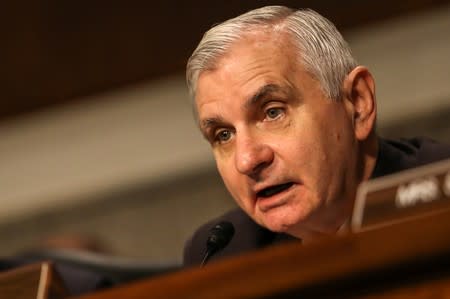Democrats alarmed about possible U.S. withdrawal from Open Skies treaty
By Arshad Mohammed and Jonathan Landay
WASHINGTON (Reuters) - Four senior Democratic lawmakers said on Tuesday they believed the Trump administration may withdraw from a treaty that allows unarmed surveillance flights over U.S., Russian and other territory, warning it would be a gift to Russia and undermine confidence in the U.S. commitment to Ukraine.
"Pulling out of the Open Skies Treaty, an important multilateral arms control agreement, would be yet another gift from the Trump administration to (Russian President Vladimir) Putin," the Democrats on the House and Senate foreign relations and armed services committees wrote in a letter to the U.S. secretaries of state and defense seen by Reuters.
"The Open Skies Treaty is a critical element of U.S. and European security, and a decision to withdraw would be another blow to regional stability as well as Ukrainian security," wrote Senators Robert Menendez and Jack Reed, respectively the top Democrats on the Senate foreign relations and armed services panels, and congressmen Eliot Engel and Adam Smith, chairs of the House foreign affairs and armed services panels, respectively.
The treaty, which was signed in 1992 and entered into force in 2002, permits each of the nations that are parties to it to carry out short-notice, unarmed surveillance flights over the entire territory of the other parties.
The purpose of the treaty, which allows nations to collect information on one another's military forces, is to increase transparency and build confidence among the states that are party to it, including the United States, Russia and Ukraine.
Asked to comment on the letter, a State Department spokesman who spoke on condition of anonymity said: "We do not comment on congressional correspondence. We continue to implement the treaty and are in full compliance with our obligations under this treaty, unlike Russia."
The Pentagon did not immediately reply to a request for comment.
In their letter, the four Democrats said the United States carried out an extraordinary flight under the treaty in December 2018, after Russia had opened fire on and seized three Ukrainian navy ships and their crews in a Nov. 25 incident in the Black Sea, as well as in 2014, after Russia annexed Crimea from Ukraine.
"Withdrawing from the Open Skies Treaty would be perceived as casting further doubt on the status of the United States commitment to Ukraine's security and would advance the Russian narrative that the United States is an unreliable partner in the region," added the letter to Secretary of State Mike Pompeo and Secretary of Defense Mark Esper.
Some experts and administration officials believe the treaty has outlived its usefulness, partly because of alleged violations by Moscow. These include restrictions Moscow imposed on certain observation flights over Kaliningrad, a Russian enclave on the Baltic Sea sandwiched between Poland and Lithuania, and flights near the disputed border between Russia and Georgia.
In response, the United States in 2016 restricted Russian observation flights over the Pacific Fleet in Hawaii and missile defense interceptor sites at Fort Greely, Alaska.
A former Trump administration official, speaking on condition of anonymity, said the treaty was outdated because the United States can share satellite imagery that is not overly sensitive with other countries. The former official also said countries now have access to high-quality commercial satellite photographs.
"We can share satellite overhead depending on how sensitive it is," the former official said. "A lot of this you can get from commercial satellites too."
According to the Arms Control Association nonprofit group, 34 states are party to the treaty while a 35th, Kyrgyzstan, has signed but not ratified it.
(Reporting by Arshad Mohammed and Jonathan Landay; Editing by Tom Brown and Richard Pullin)



